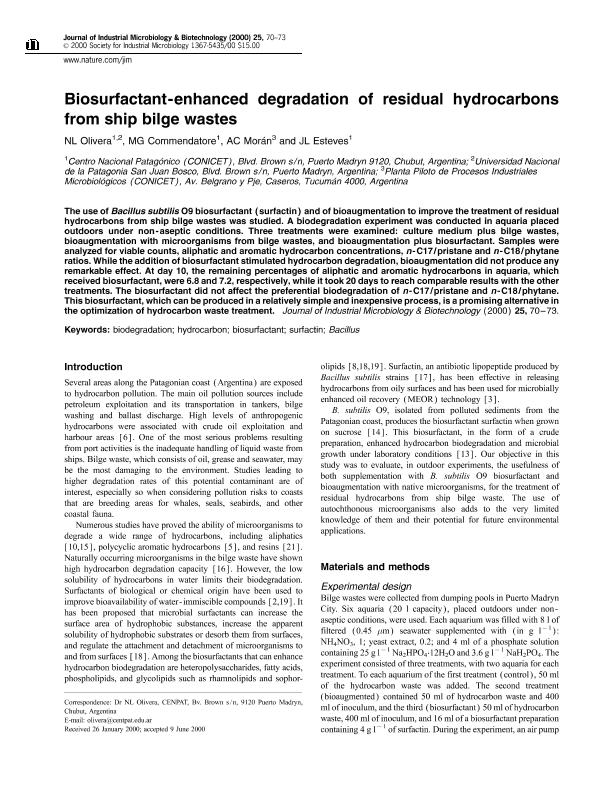Mostrar el registro sencillo del ítem
dc.contributor.author
Olivera, Nelda Lila

dc.contributor.author
Commendatore, Marta Graciela

dc.contributor.author
Morán, A. C.
dc.contributor.author
Esteves, Jose Luis

dc.date.available
2019-02-27T21:34:39Z
dc.date.issued
2000-07
dc.identifier.citation
Olivera, Nelda Lila; Commendatore, Marta Graciela; Morán, A. C.; Esteves, Jose Luis; Biosurfactant-enhanced degradation of residual hydrocarbons from ship bilge wastes; Springer Heidelberg; Journal of Industrial Microbiology & Biotechnology; 25; 2; 7-2000; 70-73
dc.identifier.issn
1367-5435
dc.identifier.uri
http://hdl.handle.net/11336/70929
dc.description.abstract
The use of Bacillus subtilis O9 biosurfactant (surfactin) and of bioaugmentation to improve the treatment of residual hydrocarbons from ship bilge wastes was studied. A biodegradation experiment was conducted in aquaria placed outdoors under non-aseptic conditions. Three treatments were examined: culture medium plus bilge wastes, bioaugmentation with microorganisms from bilge wastes, and bioaugmentation plus biosurfactant. Samples were analyzed for viable counts, aliphatic and aromatic hydrocarbon concentrations, n-C17/pristane and n-C18/phytane ratios. While the addition of biosurfactant stimulated hydrocarbon degradation, bioaugmentation did not produce any remarkable effect. At day 10, the remaining percentages of aliphatic and aromatic hydrocarbons in aquaria, which received biosurfactant, were 6.8 and 7.2, respectively, while it took 20 days to reach comparable results with the other treatments. The biosurfactant did not affect the preferential biodegradation of n-C17/pristane and n-C18/phytane. This biosurfactant, which can be produced in a relatively simple and inexpensive process, is a promising alternative in the optimization of hydrocarbon waste treatment.
dc.format
application/pdf
dc.language.iso
eng
dc.publisher
Springer Heidelberg

dc.rights
info:eu-repo/semantics/openAccess
dc.rights.uri
https://creativecommons.org/licenses/by-nc-sa/2.5/ar/
dc.subject
Bacillus
dc.subject
Biodegradation
dc.subject
Biosurfactant
dc.subject
Hydrocarbon
dc.subject
Surfactin
dc.subject.classification
Meteorología y Ciencias Atmosféricas

dc.subject.classification
Ciencias de la Tierra y relacionadas con el Medio Ambiente

dc.subject.classification
CIENCIAS NATURALES Y EXACTAS

dc.title
Biosurfactant-enhanced degradation of residual hydrocarbons from ship bilge wastes
dc.type
info:eu-repo/semantics/article
dc.type
info:ar-repo/semantics/artículo
dc.type
info:eu-repo/semantics/publishedVersion
dc.date.updated
2019-01-09T14:39:29Z
dc.identifier.eissn
1476-5535
dc.journal.volume
25
dc.journal.number
2
dc.journal.pagination
70-73
dc.journal.pais
Alemania

dc.journal.ciudad
Heidelberg
dc.description.fil
Fil: Olivera, Nelda Lila. Consejo Nacional de Investigaciones Científicas y Técnicas. Centro Nacional Patagónico; Argentina
dc.description.fil
Fil: Commendatore, Marta Graciela. Consejo Nacional de Investigaciones Científicas y Técnicas. Centro Nacional Patagónico; Argentina
dc.description.fil
Fil: Morán, A. C.. Consejo Nacional de Investigaciones Científicas y Técnicas. Centro Científico Tecnológico Conicet - Tucumán. Planta Piloto de Procesos Industriales Microbiológicos; Argentina
dc.description.fil
Fil: Esteves, Jose Luis. Consejo Nacional de Investigaciones Científicas y Técnicas. Centro Nacional Patagónico; Argentina
dc.journal.title
Journal of Industrial Microbiology & Biotechnology

dc.relation.alternativeid
info:eu-repo/semantics/altIdentifier/url/https://link.springer.com/article/10.1038/sj.jim.7000037
dc.relation.alternativeid
info:eu-repo/semantics/altIdentifier/doi/https://doi.org/10.1038/sj.jim.7000037
Archivos asociados
